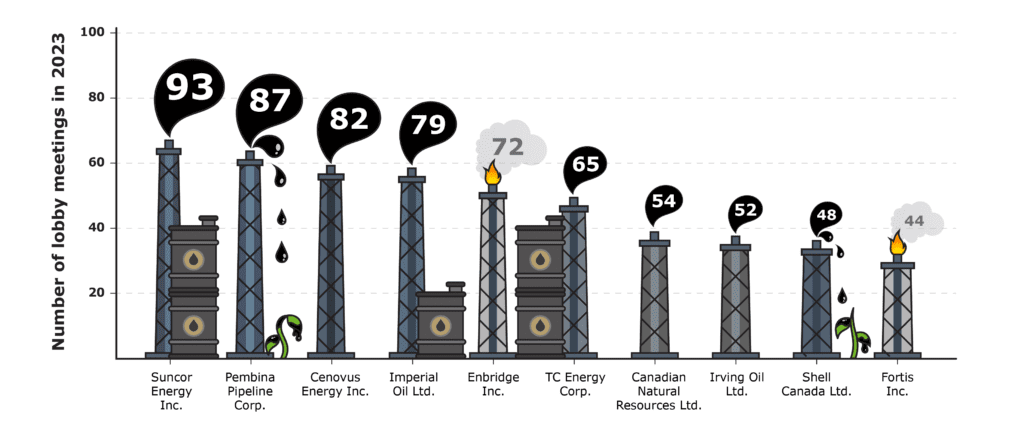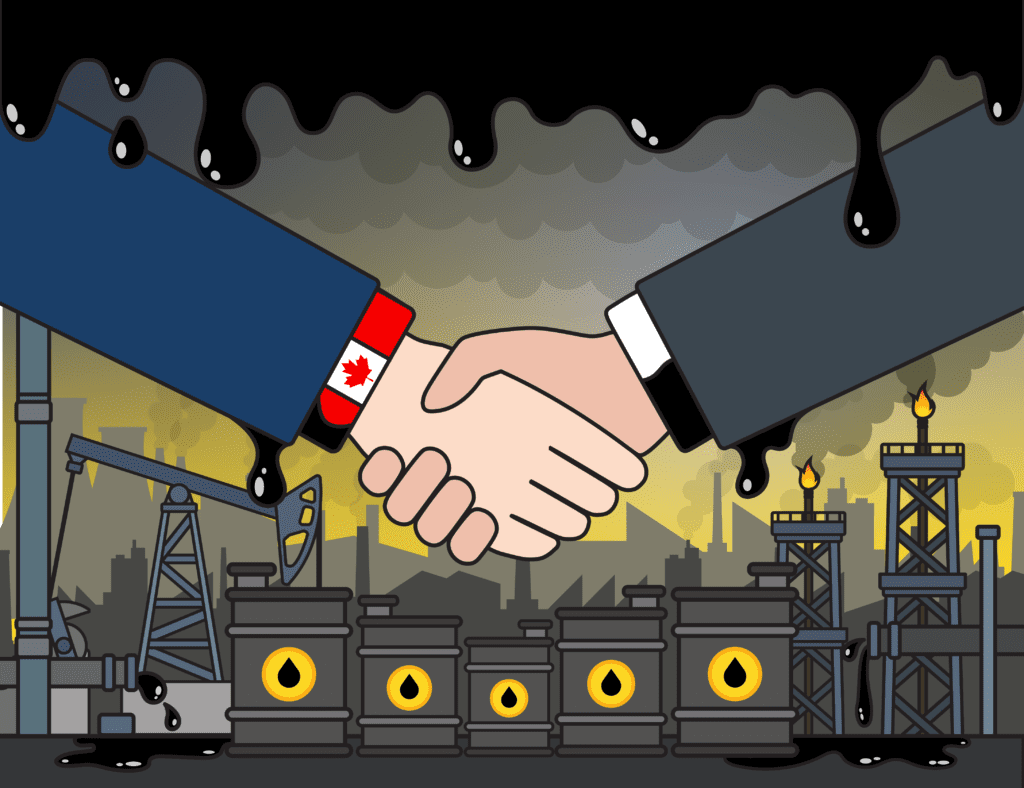Big Oil’s Relentless Lobbying Efforts are Obstructing Climate Progress on Parliament Hill
A new report by Environmental Defence analyzes the 1,255 lobby meetings the fossil fuel industry held with the government in 2023
Montréal/Tiohtià:ke | Traditional, unceded lands of the Kanien’kehá:ka/Mohawk Nation, a gathering place for many First Nations, including the Anishinaabeg – A new report released today by Environmental Defence, Big Oil’s Big Year: A Summary of Big Oil’s 2023 Federal Lobbying, finds that oil and gas companies and industry associations continue to influence climate progress through persistent lobbying. In 2023, they had at least 1,255 lobby meetings with the federal government. The industry predominantly targets its lobbying efforts at the ministries and ministers responsible for climate policy.
“Oil and gas companies continue to delay and weaken the climate policies we urgently need through their relentless lobbying efforts,” says Emilia Belliveau, Energy Transition Program Manager at Environmental Defence. “The lobby meetings we track and insights in this report are really just the tip of the iceberg when it comes to the tactics these companies use to obstruct climate action. Still, it’s important for the public to see how much access the oil and gas industry has to both elected representatives and public service staff.”
The report compiles data from the Federal Registry of Lobbyists. It highlights the most active fossil fuel companies and industry associations, as well as the Members of Parliament, ministries and ministers targeted for lobbying. Some of the key takeaways from the report include:
- Fossil fuel companies and their main industry associations had at least 1,255 meetings with the federal government in 2023. That means Big Oil lobbied Parliament nearly five times per working day.
- Industry associations were two of the top three most active fossil fuel lobbyists in 2023, with the Pathways Alliance registering 104 meetings and the Canadian Association of Petroleum Producers registering 91.
- The five companies that lobbied the most were Suncor (93 meetings), Pembina Pipeline Corp (87 meetings), Cenovus (82 meetings), Imperial Oil (79 meetings) and Enbridge (72 meetings).
- The federal ministries most frequently targeted by lobbyists were Natural Resources Canada (NRCan), Environment and Climate Change Canada (ECCC), and Finance Canada (FIN).
- NRCan staff participated in at least 313 meetings with oil and gas lobbyists, including 34 with Minister of Energy and Natural Resources Jonathan Wilkinson present.
- ECCC staff participated in 253 meetings, including 12 with Environment and Climate Change Minister Steven Guiltbeault present.
- Finance Canada staff participated in 118 meetings.
- Oil and gas companies and industry associations lobbied Members of Parliament 410 times.

Figure 1. Top Ten Oil and Gas Company Lobbyists
These figures do not capture the entire extent of the industry’s access, given that the data only includes meetings initiated by the companies that meet the requirements for lobby reporting and not meetings set up by the government.
The report reveals the outsized influence of the Pathways Alliance and its member companies. The Pathways Alliance, the newest oil sands lobbyist consortium, consists of Suncor, Imperial Oil, MEG Energy, Cenovus, Canadian Natural Resources Ltd, and ConocoPhillips. The interests of the Pathways Alliance and its member companies were the most thoroughly represented through lobbying, occupying five spots on the list of the ten most active oil and gas lobbyists. Combining the individual lobbying of Pathways Alliance member companies with the meetings registered by the Alliance, the government had at least 469 registered meetings with this coalition.
“The Pathways Alliance has been readily granted frequent meetings with federal ministries. This is particularly concerning because Pathways has done so much to try and greenwash the oil sands,” says Belliveau. “The Pathways Alliance attempted to rebrand their member companies with massive advertising campaigns that made misleading claims about becoming ‘net-zero’. But these companies’ oil sands extraction operations are some of the largest sources of climate pollution in Canada. Despite this, the oil sands rebrand seems to have succeeded in affording the Pathways Alliance a closer working relationship with the government. The outcome for climate policy in Canada is that regulations have been diluted with loopholes or have been moving at a snail’s pace to the finish line. And we’ve seen the government prioritize and pour taxpayer dollars into the oil industry’s carbon capture pipe-dream instead of cost-effective and readily available climate solutions.”
Given the fossil fuel industry’s history of using political influence to delay and weaken climate policy, Environmental Defence calls on Ministers and MPs to stop accepting meetings with fossil fuel industry lobbyists and increase transparency around their influence on Canada’s climate policies.
Background Information
- The Narwhal recently conducted an investigation on lobbying tactics based on a leaked recording of a lobbyist for TC Energy instructing a group on how to sway the government. The lobbyist described having people bump into politicians outside of work to blend the personal and professional, drafting proposed policies that they give to “underpaid and overworked” government staffers to submit as briefing notes on government letterhead, and even working to influence Canadian ambassadors abroad to deliver pro-fossil fuel industry messages to politicians.
- Research by the InfluenceMap investigated the Canadian oil and gas industry’s attempts to influence climate and energy policy. InfluenceMap’s analysis shows widespread use of “net-zero greenwashing.” They also collected evidence of Cenovus Energy, Canadian Natural Resources Limited, Imperial Oil, and TC Energy fighting against climate policy.
- In follow-up research, the InfluenceMap specifically investigated the Pathways Alliance. Their work further demonstrates how Pathways attempted to rebrand itself as climate-friendly oil sands in the eyes of the public and policymakers, particularly through the promotion of carbon capture and storage (CCS). InfluenceMap states, “Despite their overwhelming advocacy for CCS, Pathways has raised contradictory concerns about the reliability of CCS technologies in more direct communications with policymakers and has opposed government mandates for CCS.” And further noted that Pathways has “advocated for the withdrawal of the Oil & Gas Emissions Cap, attempted to weaken oil and gas sector methane regulations, and advocated for delays and exemptions in the Clean Electricity Regulations.”
- Big Oil has a long history of denying climate change and promoting disinformation to greenwash the fossil fuel industry. This is well-documented in the US House Committee on Oversight and Accountability’s joint staff report Denial, Disinformation and Doublespeak: Big Oil’s Evolving Efforts to Avoid Accountability for Climate Change”
- The oil and gas sector is Canada’s largest source of GHG emissions, accounting for 31% of national emissions in 2022, the most recently reported year. Oil sands make up the largest percentage of the sector’s emissions. Oil sands sites are some of the largest physical asset sources of emissions in Canada, with the Kearl Oil Sands Project in Alberta being the largest single emitter. Furthermore, a 2024 study showed that oil sands carbon emissions are drastically underreported.
ABOUT ENVIRONMENTAL DEFENCE (environmentaldefence.ca):
Environmental Defence is a leading Canadian environmental advocacy organization that works with government, industry and individuals to defend clean water, a safe climate and healthy communities.
– 30 –
For more information or to request an interview, please contact:
Midhat Moini, Environmental Defence, media@environmentaldefence.ca





